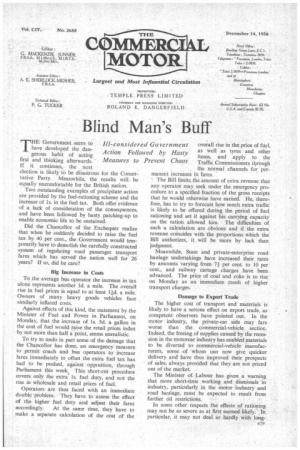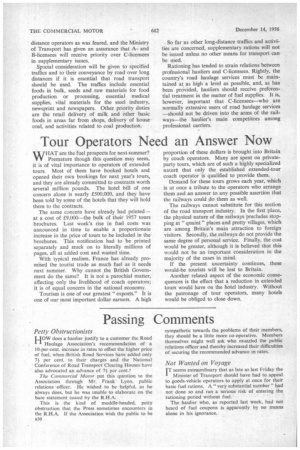Blind Man's Buff
Page 37

Page 38

If you've noticed an error in this article please click here to report it so we can fix it.
THE Government. seem to have developed the dangerous habit of acting first and thinking afterwards. " If it continues, the next • election is likely to be disastrous for the Conservative Party. Meanwhile, the results will, be equally uncomfortable for the British nation.
Two outstanding examples of precipitate action are provided by the fuel-rationing scheme and the increase of is. in the fuel tax. Both offer evidence of a lack of consideration of the Consequences, and have been followed by hasty patching-up to enable economic life to be sustained.
Did the Chancellor of the Exchequer realize that when he suddenly decided to raise the fuel tax by 40 per cent., the Government would temporarily have to demolish the carefully constructed system of regulating road passenger transport fares which has served the nation well for 26 years? If so, did he care?
Big Increase in Costs To the average bus operator the increase in tax alone represents another id. a mile. The overall rise in fuel prices is equal to at least lid. a mile. Owners of many heavy goods vehicles face similarly inflated costs.
Against effects of this kind, the statement by the Minister of Fuel and Power in Parliament, on Monday, that the increase of is. 5d. a gallon in the cost of fuel would raise the retail prices index by not more than half a point, seems unrealistic.
To try to undo in part some of the damage that the Chancellor has done, an emergency measure to permit coach and bus operators to increase fares immediately to offset the extra fuel tax has had to be pushed, against opposition, through Parliament this week. This short-cut procedure covers only the extra is. fuel duty, and not the rise in wholesale and retail prices of fuel.
Operators are thus faced with an immediate double problem. They have to assess the effect of the higher fuel duty and adjust their fares accordingly. At the same time, they have to make a separate calculation of the cost of the overall rise in the price of fuel, as well as tyres and other items, and apply to the Traffic Commissioners through the normal channels for permanent increases in fares.
' The Bill limits the amount of extra revenue that any operator may seek under the emergency procedure. to a specified fraction of the gross receipts that he would otherwise have earned. He, therefore, has to try to forecaSt how much extra traffic is likely to be offered during the period of fuel rationing and set it against his carrying capacity on the ration allowed him. The difficulties of such a calculation are obvious and if the extra revenue coincides with the proportions which the Bill authorizes, it will be more by luck than judgment.
Meanwhile. State and private-enterprise road haulage undertakings have increased their rates by amounts varying from 71 per cent. to 10 per cent., and railway cartage charges have been advanced. The price of coal and coke is to rise on Monday as an immediate result of higher transport charges.
Damage to Export Trade The higher cost of transport and materials is likely to have a serious effect on export trade, as competent observers have pointed out. In the motor industry, the private-car side may fare worse than the commercial-vehicle section. Indeed, the freeing of supplies caused by the recession in the motorcar industry has enabled materials to be diverted to commercial-vehicle manufacturers, some of whom can now give quicker delivery and have thus improved their prospects of sales, always provided that they are not priced out of the market.
The Minister of Labour has given a warning that more short-time working and dismissals in industry, particularly in the motor industry and road haulage, must be expected to result from further Oil restrictions.
In some other respects the effects of ratiOning may not be so severe as at first seemed likely. In particular, it may not deal so hardly with longB29 distance operators as was feared, and the Ministry of Transport has given an assurance that Aand B-licensees will receive priority over C-licensees in supplementary issues.
Special consideration will be given to specified traffics and to their conveyance by road over long distances if it is essential that road transport should be used. The traffics include essential foods in bulk, seeds and raw materials for food production or processing, essential medical supplies, vital materials for the steel industry, newsprint and newspapers. Other priority duties are the retail delivery of milk and other basic foods in areas far from shops, delivery of house coal, and activities related to coal production. So far as other long-distance traffics and activities are concerned, supplementary rations will not be issued unless no other means for transport can be used.
Rationing has tended to strain relations between professional hauliers and C-licensees. Rightly, the country's road haulage services must be maintained at as high a level as possible, and, as has been provided, hauliers should receive preferential treatment in the matter of fuel supplies. It is, however, important that C-licensees—who are normally extensive users of road haulage services —should not be driven into the arms of the railways—the haulier's main competitors among professional carriers.
















































































































